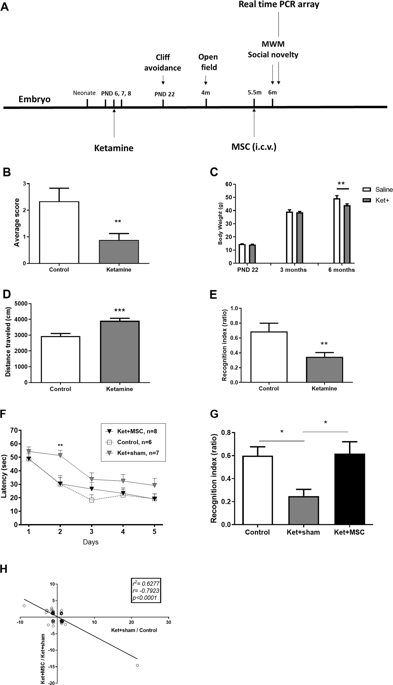Molecular Psychiatry ( IF 11.0 ) Pub Date : 2019-12-11 , DOI: 10.1038/s41380-019-0623-x Nikolai Gobshtis 1, 2 , Matanel Tfilin 1 , Vadim E Fraifeld 2 , Gadi Turgeman 1, 3

|
Schizophrenia is a neurodevelopmental disease with a mixed genetic and environmental aetiology. Impaired adult hippocampal neurogenesis was suggested both as a pathophysiological mechanism and as a target for therapy. In the present study, we utilized intracerebroventricular transplantation of bone marrow-derived mesenchymal stem cells (MSC) as a means to enhance hippocampal neurogenesis in the ketamine-induced neurodevelopmental murine model for schizophrenia. Syngeneic MSC have successfully engrafted and survived for up to 3 months following transplantation. Improvement in social novelty preference and prepulse inhibition was noted after transplantation. In parallel to behavioural improvement, increased hippocampal neurogenesis as reflected in the numbers of doublecortin expressing neurons in the dentate gyrus and gene expression was noted both 2 weeks following transplantation as well as 3 months later compared with nontreated animals. An independent aging effect was observed for both behaviour and neurogenesis, which was attenuated by MSC treatment. As opposed to MSC treatment, short-term treatment with clozapine was efficient only during treatment and diminished 3 months later. Interestingly, while shortly after transplantation (2 weeks) behavioural improvement was correlated mainly to FGF2 gene expression, 3 months later it was mainly correlated to the expression of the notch ligand DLL1. This suggests that long-term effect during ageing may depend on neural stem cell self-renewal. We conclude that a single intracerebroventricular injection of bone marrow-derived MSC can suffice for long-term reversal of changes in adult hippocampal neurogenesis and improve schizophrenia-like behavioural phenotype inflicted by developmental exposure to ketamine in mice.
中文翻译:

间充质干细胞移植可长期缓解精神分裂症样行为并增加神经发生
精神分裂症是一种具有混合遗传和环境病因的神经发育疾病。成人海马神经发生受损被认为是一种病理生理机制和治疗靶点。在本研究中,我们利用骨髓间充质干细胞 (MSC) 的脑室内移植来增强氯胺酮诱导的精神分裂症神经发育小鼠模型中的海马神经发生。Syngeneic MSC 已成功移植并在移植后存活长达 3 个月。移植后注意到社会新奇偏好和前脉冲抑制的改善。在行为改善的同时,与未治疗的动物相比,在移植后 2 周和 3 个月后,海马神经发生增加,反映在齿状回中表达双皮质素的神经元数量和基因表达。观察到行为和神经发生的独立衰老效应,MSC 治疗减弱了这种效应。与 MSC 治疗相反,氯氮平的短期治疗仅在治疗期间有效,并在 3 个月后减弱。有趣的是,虽然移植后不久(2 周)行为改善主要与 FGF2 基因表达相关,但 3 个月后它主要与缺口配体 DLL1 的表达相关。这表明衰老过程中的长期影响可能取决于神经干细胞的自我更新。


























 京公网安备 11010802027423号
京公网安备 11010802027423号